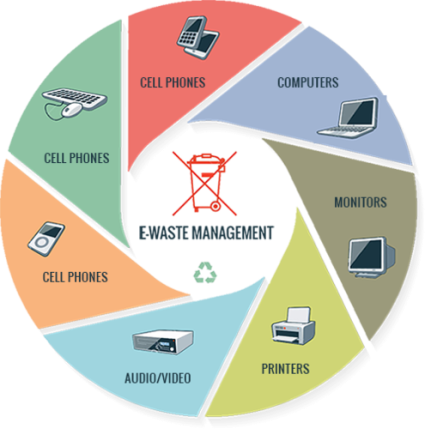Ahmedabad
(Head Office)Address : 506, 3rd EYE THREE (III), Opp. Induben Khakhrawala, Girish Cold Drink Cross Road, CG Road, Navrangpura, Ahmedabad, 380009.
Mobile : 8469231587 / 9586028957
Telephone : 079-40098991
E-mail: dics.upsc@gmail.com

E-Waste Management
News: The Ministry of Environment, Forest and Climate Change has released the Draft notification for Electronic Waste Management for public feedback.
About:
Electronic Goods Covered
• A wide range of electronic goods, including laptops, landline and mobile phones, cameras, recorders, music systems, microwaves, refrigerators and medical equipment have been specified in the notification.
E-waste collection target
• Consumer goods companies and makers of electronics goods have to ensure at least 60% of their electronic waste is collected and recycled by 2023 with targets to increase them to 70% and 80% in 2024 and 2025, respectively.
• Companies will have to register on an online portal and specify their annual production and ewaste collection targets.
EPR Certificates
• The rules bring into effect a system of trading in certificates, akin to carbon credits, that will allow companies to temporarily bridge shortfalls.
• The rules lay out a system of companies securing Extended Producer Responsibility (EPR) certificates.
• These certificates certify the quantity of e-waste collected and recycled in a particular year by a company and an organization may sell surplus quantities to another company to help it meet its obligations.
Penalty
• Companies that don’t meet their annual targets will have to pay a fine or an ‘environmental compensation’ but the draft doesn’t specify the amount of fines.
Role of State Governments
• The state governments are required to earmark industrial spaces for e-waste dismantling and recycling facilities, undertaking industrial skill development and establishing measures for protecting the health and safety of workers engaged in these facilities.
Challenges concerning E-waste management:
• Less involvement of people – Consumers themselves are not involved as they are reluctant to give away their electronic devices for recycling purposes.
• No incentives and dearth of guidelines – There are no clear guidelines for the unorganized sector to handle E-waste.
• Child Labor – In India, about 4.5 lakh child laborers in the age group of 10-14 are observed to be engaged in various e-activities and without much safeguards and protection.
• Health Hazard – E-waste contain over 1000 toxic materials, which contaminate soil and groundwater.
• Reluctance of authorities involved – Lack of coordination between various authorities responsible for ewaste management and disposal including the non-involvement of municipalities.
• Security implications – End of life computers often contain sensitive personal information and bank account details which when not deleted leave opportunity for fraud.

Address : 506, 3rd EYE THREE (III), Opp. Induben Khakhrawala, Girish Cold Drink Cross Road, CG Road, Navrangpura, Ahmedabad, 380009.
Mobile : 8469231587 / 9586028957
Telephone : 079-40098991
E-mail: dics.upsc@gmail.com
Address: A-306, The Landmark, Urjanagar-1, Opp. Spicy Street, Kudasan – Por Road, Kudasan, Gandhinagar – 382421
Mobile : 9723832444 / 9723932444
E-mail: dics.gnagar@gmail.com
Address: 2nd Floor, 9 Shivali Society, L&T Circle, opp. Ratri Bazar, Karelibaugh, Vadodara, 390018
Mobile : 9725692037 / 9725692054
E-mail: dics.vadodara@gmail.com
Address: 403, Raj Victoria, Opp. Pal Walkway, Near Galaxy Circle, Pal, Surat-394510
Mobile : 8401031583 / 8401031587
E-mail: dics.surat@gmail.com
Address: 303,305 K 158 Complex Above Magson, Sindhubhavan Road Ahmedabad-380059
Mobile : 9974751177 / 8469231587
E-mail: dicssbr@gmail.com
Address: 57/17, 2nd Floor, Old Rajinder Nagar Market, Bada Bazaar Marg, Delhi-60
Mobile : 9104830862 / 9104830865
E-mail: dics.newdelhi@gmail.com